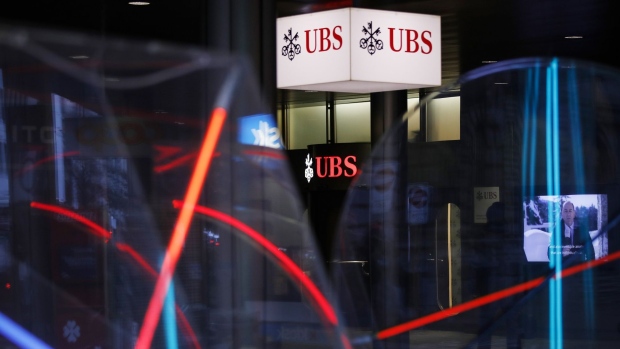Jan 26, 2021
UBS plans US$4.5B buyback after wealth management surge
, Bloomberg News

UBS Group AG plans to buy back as much as 4 billion francs (US$4.5 billion) of shares over the next three years, bolstering shareholder returns after income from managing client assets and investment banking propelled gains at the world’s largest wealth manager.
The lender is doubling the size of a previous program and said it expects to repurchase up to US$1.1 billion of shares in the first quarter, according to a statement on Tuesday. The bank finished off the year strongly, with fourth-quarter net income of US$1.7 billion that beat analyst estimates and the Zurich-based firm meeting or beating all its targets in 2020.
The results give a boost to Chief Executive Officer Ralph Hamers, whose start at the helm of Switzerland’s largest bank barely three months ago has been overshadowed by a Dutch probe into his role in a money laundering scandal at his former employer ING Groep NV. While Chairman Axel Weber has backed the new CEO, the lender is facing a challenging year as the probe is expected to drag into 2022, when Weber is scheduled to step down.
“I have always acted with good conscience during my tenure at ING and therefore I feel confident in the good outcome of this case,” Hamers said in an interview. “I am well prepared, so I can really focus on my role as UBS CEO.”
Hamers is currently undertaking a review of all the bank’s businesses and expects to give an update on strategic initiatives and plans in the second quarter, the bank said Tuesday. Some analysts had said that targets under former CEO Sergio Ermotti weren’t ambitious enough.
UBS rose as much as 4.5 per cent and traded 1.4 per cent higher noon in Zurich. Before today, the stock had gained 4.2 per cent over the past 12 months, among the best performers of the large European banks.
Highlights from UBS fourth-quarter earnings
- Net income of US$1.7 billion vs estimate of US$1.01 billion
- Wealth management pretax profit of US$936 million vs estimate of US$903.8 million
- Investment bank pretax profit of US$529 million vs estimate of US$232.2 million
The focus on wealthy clients -- who benefited from soaring stock markets -- and relatively conservative lending have allowed UBS to sail relatively smoothly through the pandemic. The Swiss bank added just US$66 million in the quarter to cover the cost of loans going sour, compared with analyst estimates of US$159.5 million. Higher recurring fee income helped drive a 22 per cent gain in private banking, where clients added more than US$21 billion in net new money during the quarter.
“We expect revenues in the first quarter of the year to be positively influenced by seasonal factors such as higher client activity compared with the fourth quarter of 2020,” the bank said in a statement, while warning the outlook remains uncertain because of the pandemic. “Higher asset prices should have a positive effect on recurring fee income in our asset gathering businesses.”
What Bloomberg Intelligence Says
UBS’s healthy momentum entering 2021 is signaled by US$21 billion of wealth flows, with broad strength led by Asia, equities trading and fees keeping competitive pace, and target-busting cost controls.
-- Alison Williams, banking analyst
UBS previously indicated it planned to boost buy backs, while reducing a dividend that was higher than many of its competitors. The bank targeted about US$3.7 billion for shareholders in 2020, including US$2 billion set aside for buybacks. That compares with US$3.4 billion for 2019. Switzerland’s largest bank stands in contrast to its European competitors who have had their hands tied by the European Central Bank on capital return policies during the pandemic.
Still, Chief Financial Officer Kirt Gardner fielded multiple questions from analysts on a call how the outcome of a French tax trial could affect the buyback program. UBS said the trial will inform repurchases and that the program gives the bank flexibility in how and when to repurchases shares.
Gardner also said the bank was confident it could continue the pace of lending growth after achieving an initial target to increasing loans to its richest clients.
Muted credit impairments bring UBS closer to the top Wall Street firms compared with many of its European peers. Five of the biggest U.S. lenders -- JPMorgan Chase & Co., Citigroup Inc., Bank of America Corp., Morgan Stanley and Wells Fargo & Co. -- cut their combined reserves for credit losses by about US$6 billion from September, sending fourth-quarter earnings beyond analysts’ estimates.
UBS’s results are also the first indication of how Europe’s investment banks fared in the final months of last year, with the Swiss bank seeing a 28 per cent jump in equities revenue, while fixed income was up 5 per cent. The top five U.S. investment banks -- which combined for a record US$30 billion in profit in the quarter -- saw their fixed-income trading revenue rise almost 10 per cent while the equities business surged 35 per cent.
UBS has a relatively small trading desk after pivoting from investment banking to wealth management in the wake of the financial crisis. Weber, who oversaw that strategy, tapped Hamers last year to add fresh ideas and momentum as rivals such as Credit Suisse Group AG gained ground on the world’s largest wealth manager.
--With assistance from Manus Cranny.